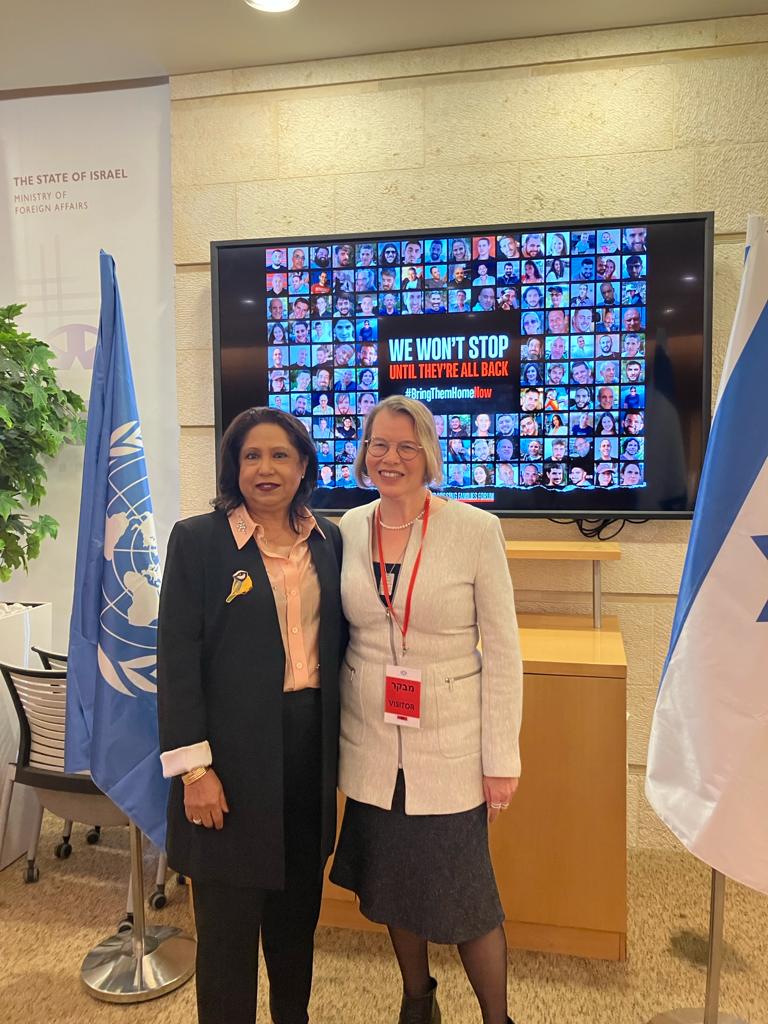Setting the Record Straight
Ruth Halperin-Kaddari of the Faculty of Law’s Ruth and Emanuel Rackman Center for the Advancement of Women’s Status at the United Nations in Geneva in November.
Ruth and Emanuel Rackman Center for the Advancement of Women’s Status
The Faculty of Law
Setting the Record Straight
Prof. Ruth Halperin-Kaddari of the Faculty of Law’s Ruth and Emanuel Rackman Center for the Advancement of Women’s Status ensured that Hamas’ weaponization of women’s bodies on October 7th can neither be denied nor downplayed in future accounts of the terror group’s one-day genocide.
Justice in Recognition
When the Faculty of Law’s Prof. Ruth Halperin-Kaddari learned of Hamas’ attack on October 7th, she explains that she immediately thought two things. First, since Hamas terrorists had been in Israelis’ homes and at the Nova festival for so long without interruption, there was a high likelihood that sexual assault took place. And second, that she needed to enlist her former colleague from her time at the Convention on the Elimination of All Forms of Discrimination Against Women (CEDAW), current U.N. Special Representative on Sexual Violence in Conflict Pramila Patten, to ensure that the international community recognized Hamas’ weaponization of women’s bodies.
“When I called Parmila, the first thing she asked me was, ‘Do you know if rape really happened in the attack?’” recalls Halperin-Kaddari. “While at first I was shocked, I quickly realized that she was right: Israel needed to be able to prove, through footage, images, and credible information, that sexual violence had occurred. This was the only way we would be able to achieve recognition and justice for the victims, and also push more effectively for the release of the hostages.”

Prof. Ruth Halperin-Kaddari with Pramila Patten, special representative of the U.N. secretary-general on sexual violence in conflict.
After gathering information from the head of the Association of Rape Crisis Centers in Israel and private therapists of Nova party survivors, as well as signatures from more than 800 international legal and gender experts calling for the condemnation of Hamas’ sex crimes, Halperin-Kaddari sent letters to a range of human-rights bodies—all of whose responses, she concedes, were at first deeply disappointing. “We were fighting against the tide of media images showing the destruction in Gaza and the narrative of Israel as the true oppressor that took hold within days of the attack,” Halperin-Kaddari explains. “There is also the fact that the vast majority of those sexually assaulted were murdered and silenced forever, and the rest taken hostage or too traumatized to speak publicly about their ordeal.”
“What we’ve done and continue to do is ensure that history is clear on what happened to the Israeli victims on October 7th. This recognition is not the final word, but rather a first critical step on the long road to justice.”
—Prof. Ruth Halperin-Kaddari, founding academic director of the Ruth and Emanuel Rackman Center for the Advancement of Women’s Status, the Faculty of Law
Yet Halperin-Kaddari was undeterred, and after months of pushing for the U.N. to undertake an official investigation—and convincing an understandably wary Israeli government to allow it—her efforts culminated in the March 4th publication of the results of a fact-finding mission that determined “reasonable grounds for the claim of sexual violence on October 7th and “clear and convincing” evidence for sexual violence committed against hostages taken by Hamas. Moreover, points out Halperin-Kaddari, although the report was originally intended to be an internal document, Patten herself took the step of making it accessible to the wider public.
“Years from now, when lecturers in universities speak about sexual violence as a tool of war, they will mention Bosnia, Rwanda, Syria—and Kfar Aza, the Nova party, and Kibbutz Be’eri,” concludes Halperin-Kaddari, whose work on behalf of October 7th victims of sexual violence is now part of the Dina Project 07/10, an initiative of the Faculty of Law’s Ruth and Emanuel Rackman Center for the Advancement of Women’s Status to ensure accountability for Hamas terrorists who perpetrated acts of sexual violence against Israelis. “What we’ve done and continue to do is ensure that history is clear on what happened to the victims on October 7th. This recognition is not the final word, but rather a first critical step on the long road to justice.”
A Higher Degree of Recognition: Halperin-Kaddari Awarded Honorary Doctorate from Brandeis University
On March 12, Brandeis University President Ronald Liebowitz called Prof. Ruth Halperin-Kaddari with “the incredibly surprising and deeply gratifying” news that she had been selected as one of four recipients of an honorary degree at the institution’s 73rd commencement ceremony this May. Explaining that since her son was then serving in Gaza, she was instinctively terrified whenever the phone rang, Halperin-Kaddari—who was also selected as one of the “Leading Women of 2024” by the Israeli news outlet Calcalist—recalls that “the president was at first taken aback when I cried at his news. But I was simply so relieved, as well as so moved by this enormous honor they sought to bestow.” Chosen for her long-time advocacy on behalf of women’s rights, she will accept the degree alongside documentary filmmaker Ken Burns, trailblazing advocate for African Americans in higher education Ruth Simmons, and Jewish-studies scholar and education advocate Roy DeBerry.